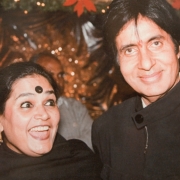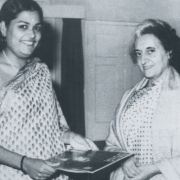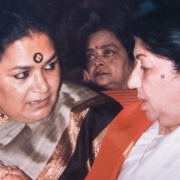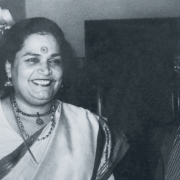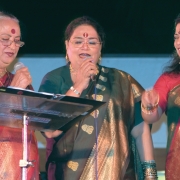
People
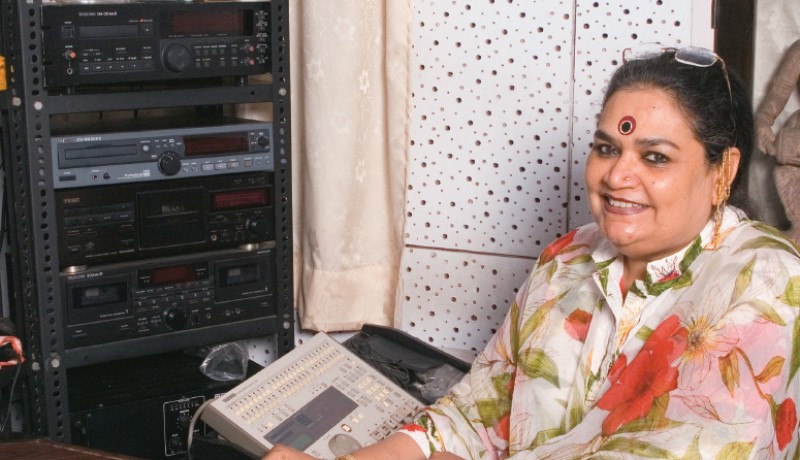
Singer Usha Uthup recently forayed into music direction and proved that even with silver in your hair, your dreams can be in Technicolor. Rajashree Balaram feels the vibe
The lady sitting at the corner table muttered, “What’s this amma doing here?” Usha Uthup heard the jeer, all right. But she had a song to sing and hardly any time to take offence. She approached the dance floor at Trinca’s pub on Kolkata’s Park Street—mound of jasmine in her plaited hair, large red bindi on her forehead, bright silk sari draped around her buxom frame—and belted out a sizzling cabaret number. It was 1969.
Trinca’s is no longer the swish hangout it once was but Uthup’s romance with Kolkata has stood the test of time—she has lived and sung there for the past 35 years. Along the way, she graduated from being a nightclub singer to singing playback for Hindi films; opened her own multi-track recording studio in Kolkata; and performed across the world. In 2007, she acted in Malayalam film Pothan Vava, where she plays a fiery advocate. Until recently, she was on the jury of television channel Asianet’s Idea Star Singer, a talent hunt show for young Malayalee singers. And in March 2008, Uthup—often dismissed by hardcore music critics as the lady who sings other people’s songs—made her debut as music director for Love Songs, featuring Jaya Bachchan and Om Puri, at the age of 60. “It was a challenging experience and I love challenges,” she says. “I’m always ready to try new things.”
Some things, though, remain the same—she still turns out in traditional Indian garb while she sings jazz and country western numbers. When Harmony meets the singer in Bata Nagar on the dusty fringes of Kolkata, she is wearing a bottle-green Kanjeevaram sari and a large crimson bindi, getting ready to perform with her sisters Maya Sami, 54, and Indira Srinivasan, 71, for a show organised by the United Credit Belani Group who are developing a riverside residential complex in the area. Coming from a traditional middle-class Tamil Brahmin family, Uthup claims she always felt more at ease in saris and salwar kameez than jeans. “I’m comfortable in my own skin,” she insists. In a world of slinky, sequined gowns and flamboyant wigs, she—unwittingly—stood apart as the girl next door. “Men felt comfortable bringing their wives to the club as the women had no reason to feel threatened by me,” she says.
On stage too, she pokes fun at herself, her weight, and ribs her sisters—clad like her, in resplendent saris—as she interacts with the audience. There isn’t much of a crowd, just about 250 people or so. But Uthup’s on-stage verve somehow makes the gathering seem larger. She refuses to let the empty seats deflate her enthusiasm. Instead she is delighted to see auto-rickshaw drivers and passers-by gathered outside the gate. “See that crowd outside the gate,” she bellows into the microphone. “Now, that’s what makes me really happy!” She waves out to them, greeting them loudly in Bangla as she sways to the beats of the synthesiser.
“Usha didi has this incredible ability to adapt to the age and profile of her audience,” says event manager Oindrilla Dutt, who has organised more than 40 shows for Uthup in the past 18 years. “She is informal and irreverent with the younger generation and surprisingly genteel while performing for the older crowd.” On stage, as Uthup’s voice flits from the Latin beat of Copa cabana to the folksy Lemon tree and pop staple We are the world, her energy is infectious. She has just returned from a three-day marathon show in Doha in Qatar, and the day after meeting Harmony she will be on a 6 am flight to Mumbai to record for the promotional album for Shah Rukh Khan’s newly minted cricket team, Knight Riders. From Mumbai, she will fly to Delhi to perform at Siri Fort auditorium and then to Nagpur.
Her knees hurt and her voice is gravely with fatigue but she remains chatty as we head to her house in Ballygunje in central Kolkata in her Toyota Innova. When she speaks about her upbringing, a clear picture emerges of a non-conformist. While elder sisters Indira and Uma (who comprised the 1950s singing duo, ‘Sami Sisters’) learnt Carnatic music, Uthup has no formal training in any kind of music. Her parents—a police officer and a traditional Tamil Brahmin housewife—were ardent music enthusiasts. Besides Radio Ceylon, Beethoven, Mozart, M S Subbalakshmi, Bach, Harry Belafonte and Sinatra wafted through the household all day. When she was 12 years old, Uthup auditioned for her school choir—she went to Jesus and Mary Convent in Mumbai. She was rejected. “Years later, when I bumped into my music teacher at the Ashoka Hotel in Delhi, I sang To sir, with love for her,” she remembers. “She wept through the song, and by the end of it so did I.”
In the summer of 1967, while vacationing with her aunt in Chennai, she sang an impromptu number at a club. Impressed with her voice, the manager asked her to sing at the club through the length of her vacation. “I suddenly discovered that I found the greatest satisfaction when people clapped at my songs… even now, I live for that,” admits Uthup.
After stints at Savera Hotel in Chennai and Hotel Ritz in Mumbai, she ended up becoming one of the most popular nightclub singers in Kolkata. She went to record pop albums in English like Scotch and Soda, Beautiful Sundays, You Set My Heart on Fire, Love Story and Ding a Ling to name a few, apart from devotional songs in Malayalam and an album of Rabindra Sangeet. While singing at the Gazebo restaurant in Mumbai, during one of her occasional visits to the city, she befriended music composer R D Burman who recommended her voice for the 1971 cult hippie flick Hare Ram Hare Krishna. The song Dum maro dum reverberated with the rebellion of a generation that yearned to break free from established norms. The film became a mega hit and Bollywood opened its doors to Uthup, resulting in hits such as One two, cha cha cha (1978) in Shalimar; Doston se pyar kiya in Shaan (1980); Hari om hari in Pyara Dushman (1980); and Ramba ho in Armaan (1981).
She was nominated thrice for the Filmfare Award for Best Female Playback Singer—but didn’t win. “Back then, they were not willing to experiment with unusual voices like they do now,” says Uthup, who has sung in more than 13 Indian and eight foreign languages including Swahili, Russian and Creole. “At the same time,” her voice rising a notch, “I feel I survived this long because of my stage presence. My image is all my own. For instance, when people watch Madhuri Dixit sing on screen, they see Madhuri not Lata Mangeshkar… with all due respect to Lataji.” Of the new generation, she admires composers like A R Rehman and Shankar-Ehsaaan-Loy—Illaiyaraja is her all-time favourite—and singers Sunidhi Chauhan, Sonu Nigam and Shreya Goshal. Despite the influx of newcomers, though, she has held onto her fan following. One among them is composer Bappi Lahiri, who calls her “the original pop diva of India”.
But there are many who disagree. For instance, in 1983, the late RSP leader Jatin Chakraborty, PWD minister in chief minister Jyoti Basu’s ministry, disrupted many of Uthup’s shows across Kolkata alleging that her music was apasanskriti (decadent). Uthup filed and won a case against the government. “When I get upset by such episodes, I always ask myself three questions: ‘Who am I? Where did I come from? Where am I going?’” says Uthup. In her subsequent Bangla album, Uthup dedicated a song, Ami shilpi, to her resolve to continue singing against all odds.
According to sister Maya Sami, if there is anything bigger than Uthup’s voice, it’s her heart. “She is extremely generous to a fault,” says Sami. Uthup has sung for many charitable causes—The Red Cross, The Spastic Society of India, government charity drives, drought and flood relief funds, old age homes, and schools for the blind—without charging a rupee. “Most people think I am very rich because I am doing so many shows,” she says wryly. “What they fail to realise is that a lot of those shows are done free for charity and we are not flooded with money.”
Her simple apartment, located on the ground floor of an old building, attests to this. It’s 10.30 pm by the time we get there. A power cut in the area has cast an eerie gloom around us. Uthup’s cosy two-bedroom apartment, though, is illuminated with battery-charged lamps. A large bronze Ganesha sculpture dominates the living room. “I am not much into religious rituals or puja, but I have my own unique relationship with God. I talk to him, yell at him, and sometimes even blackmail him,” Uthup says with a chuckle.
Photographs of her children and grandchildren are perched prominently on the shelves of a large wooden showcase. Married to Jani Uthup, who used to work with a tea plantation—now a businessman—Uthup has lived in Kolkata for the past 35 years. The couple have two children: Anjali, 35, a former radio jockey now a housewife, and Sunny, 34, who works with an event management firm. Daughter Anjali is full of praise for her mother. “I remember days when she would return from a concert at five in the morning, then cook our breakfast and lunch, stitch a dress for me and would be waiting when I got home at night.” She feels Uthup is the most indulgent grandmother her eight year-old daughter and three year-old son could have asked for.
Uthup’s nephew Adi Pocha, a filmmaker and writer, shares similar feelings. “I have learnt a lot about showbiz from Usha aunty,” he says. “She told me that it’s more important to first win the trust of the audience by giving them what they want, so they are finally able to accept what you want to offer.”
Family means a lot to Uthup, who enjoys regular get-togethers with her sisters Maya, Indira and Uma (Adi Pocha’s mother) that comprise good food, long conversations and great wine. Off stage, Indira is a housewife and Maya is a consultant with an event management firm. “My sisters understand things like good wine but I can hardly tell the difference!” she confesses. “Although I have recently developed a taste for Bailey’s Irish Cream liqueur.”
As she lounges on the sofa, she shows off her curious footwear—Reebok sneakers with golden zari straps. “Cool, aren’t they?” she asks impishly. She has given up high heels recently to placate her aching knees. But she has no plans to retire or take a break. These days, she is providing the finishing touches to a multilingual album tentatively titled Kashmir to Kanyakumari, which will feature songs in different Indian dialects. After her recent foray into music direction, she is also keen to compose more actively for films. The secret of her vitality? “I have befriended time,” she responds. “At times, even if I feel I am slowing down slightly, I tell time to wait so I can catch up.”
Photo: Shilbhadra Datta Archival photo courtesy: Usha Uthup Featured in Harmony – Celebrate Age Magazine May 2008
you may also like to read
-
For the love of Sanskrit
During her 60s, if you had told Sushila A that she would be securing a doctorate in Sanskrit in the….
-
Style sensation
Meet Instagram star Moon Lin Cocking a snook at ageism, this nonagenarian Taiwanese woman is slaying street fashion like….
-
Beauty and her beast
Meet Instagram star Linda Rodin Most beauty and style influencers on Instagram hope to launch their beauty line someday…..
-
Cooking up a storm!
Meet Instagram star Shanthi Ramachandran In today’s web-fuelled world, you can now get recipes for your favourite dishes at….



